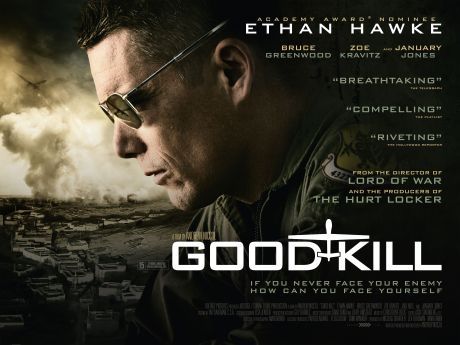Arts
You are here
Drone terrorism

April 14, 2015
While American Sniper glorifies the Iraq War, Good Kill exposes the brutality of drone warfare from Afghanistan to Yemen.
Writer/Director Andrew Niccol has made a number of dystopian films about individuals trying to escape societies dominated by repressive technology. In Gattaca, Ethan Hawke tries to make it to space, in a society where DNA imperfections are used to restrict career opportunities. In The Truman Show, reality TV has become an entire city spying on Jim Carey, who gradually realizes his world and tries to escape. In In Time, lifespan has become actual currency, and a working class Justin Timerlake fights to overturn its unequal distribution. But in Good Kill, the dystopian future of drone warfare is already here.
Game of drones
Niccol shows the absurd reality of drone pilots, wearing flight suits while they sit safely in their cubicles, assassinating people with the push of a button and then returning to the comfort of their homes. Ethan Hawke plays a former fighter pilot who becomes increasingly disillusioned with his new job as a drone pilot, killing unsuspecting people from the sky and then counting the body parts.
Drone warfare has removed those doing the killing form the environment of war at the same time as it is expanding the list of possible victims—now in countries not even declared war zones, and targets based on patterns of behaviour and “pre-emptive self-defense.”
But despite the attempt to sanitize murder through technology, it still has an impact on those ordered to push the buttons. Hawke’s character kills people in the deserts of Afghanistan from the deserts of Nevada, but this distance doesn’t prevent him from empathizing with those he sees through the computer screen. But his only interaction is through launching missiles based on US “national security interests,” whose justifications he is not allowed to question.
The process of resistance
He initially adopts a cynical attitude to the futility of war: when a cop asks “how’s your war on terror going” he responds, “kinda like your war on drugs.” When he accidentally kills a child, his commander instructs him to block it from his mind saying “you just gotta keep compartmentalizing…I don’t want you getting gun shy.”
When this fails he retreats from his family into alcohol, unable to explain or justify his job, while asking to be reassigned to his former riskier job as a fighter pilot. While his more racist colleagues have no problem killing, he finds support from a newer soldier (Zoe Kravitz), who gets the most anti-war lines of the film and encourages him towards the most difficult option: resistance.
Of course Hollywood can’t bring itself to make a truly anti-imperial film. Good Kill reinforces myths of passive Muslim women in need of violent white saviours, of nostalgia for “good war” before drones, and of the isolation of anti-war sentiment. But by Hollywood standards it’s a good alternative to the glorification of war, showing the terrorism of drones and the potential of soldiers to resist--which is a product of anti-drone activism and war resisters.
While the military hopes that drones will remove the human spirit from warfare, even this advanced technology can fail. To paraphrase Bertold Brecht, “General your drone is a powerful vehicle, it unleashes death from the sky. But it has one defect: it needs a pilot.”
If you like this article, register for Rage Against the System, a weekend conference of ideas to change the world, April 24-26 in Toronto. Sessions include "Imperialism and resistance," "Secularism, Islamophobia and the new racism," and the Toronto premier film screening of "Fennario: The Good Fight."
Section:
Topics:










